Even The Font Usage On The Crowd-Sourced Artisanal Hipster Trading Boat Will Annoy You
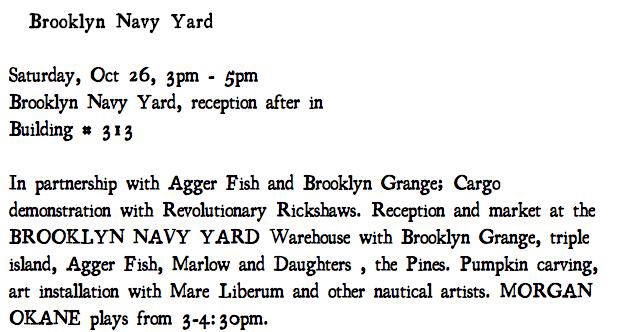
It’s everything that may annoy you about the new Brooklyn.
A barge from Vermont.
A crowd-sourced barge from Vermont.
Arriving in Brooklyn with produce and artisanal goods.
The goal of the Vermont Freight Sail Project is to establish “a zero-emissions food trading network that builds community.” The barge plans to leave with cocoa beans and locally roasted coffee.
The End Of Interns
by Llewellyn Hinkes-Jones
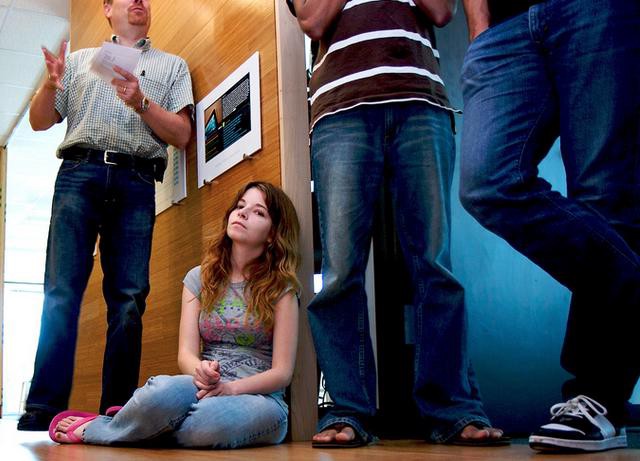
Our government runs on unpaid internships. During the recent shutdown, as many federal staff members were laid off, unpaid interns filled in the gap. Although considered volunteers, they were doing the work of a five or six figure salary just for the heck of it. That exciting opportunity to work for free may sound appealing to eager college graduates wanting to climb up the career ladder, pad their resume, and avoid working at the local plastic flower factory, but from a labor perspective it’s abominable. There’s no reason why they shouldn’t be paid. If the government can’t pay the people it takes to run the government, then there is little recourse to stop the rest of the country from passing on their work to unpaid interns.
And that transformation has already been taking place. Craigslist job postings are filled with opportunities to “work for exposure.” Online logo competitions offer graphic designers the chance to give their work away for peanuts, but only if they win. Even the foundations of wealthy COOs who write books about “Leaning In” try to take advantage of their stature by manipulating the desperate into working for free. Not only are the jobs not paid, but sometimes the employee pays the employer for the right to work. Internship placements are auctioned off to the highest bidder. Colleges pay companies to accept the free labor of their students in exchange for course credit.
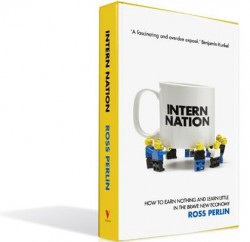
Intern Nation, from Verso Books, is available wherever one desires to obtain books.
• Powell’s
Also, Intern Labor Rights will be hosting a panel called “Breaking Down The Intern Economy” at Housing Works on October 29th.
Technically, most unpaid internships are illegal. Their legality hinges on whether the intern or the workplace benefits from the internship and whether interns do the work of regular employees. Many legal internships would be considered entry-level positions or apprenticeships if such things existed anymore. In reality, the word “internship” really has no definition since it can mean anything from unpaid to paid work, entry level to advanced, short-term to long-term stints, or prisoners of war in an internment camp. While unpaid internships were once an assumed stepping stone to working in media, that is quickly changing. After interns recently filed suit for back pay, Condé Nast has now eliminated its internship program altogether and other media organizations are reforming or eliminating their internship programs as well.
Ross Perlin’s Intern Nation is a comprehensive analysis into why unpaid internships are a slow degradation of almost every labor standard that the country has come to accept. Published last spring, he was way ahead of the coming changes in the world of internships. He graciously talked to me about the world of unpaid labor.
In short, what is wrong with the practice of offering unpaid internships?
Two basic things. First, work should be paid for, that’s a basic ethic in our society. When that doesn’t happen, you have a race to the bottom, you undermine the whole labor market, and ultimately everyone but the top 1% are worse off. Second, unpaid internships create a pay-to-play system since only some people can afford to work for zero dollars for longer than a week or two. This ultimately exacerbates social inequality because key professions get filled up with people from privileged backgrounds; it not only affects who gets ahead and does well, it also plays a big role in terms of the voices we hear in the media, politics, arts, etc.
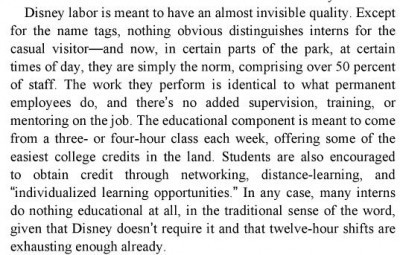
In your book, you point out that Disney uses interns on the cheap. Especially for a company that could easily afford to pay decent wages, why do people accept this?
I do talk in Intern Nation about the infamous “Disney College Program,” which brings 6,000 to 7,000 young people to Disney World each year for minimum wage “internships,” requires them to live in overpriced company housing, teaches them next to nothing and so on — principally as a way to have a revolving door of cheap, cheerful labor. It’s one of the largest internship programs in the world, and colleges literally race to funnel people in. Disney does manage to save tens of millions in wages as a result of the program. As for why people do them, mainly because schools encourage them and because it sounds fun, I guess, and perhaps it can be fun if you’re a Disney fanatic. As for earning a living, forget it. As for what this means in terms of Disney World being a safer, more well-run amusement park run by experienced people–again, forget it.
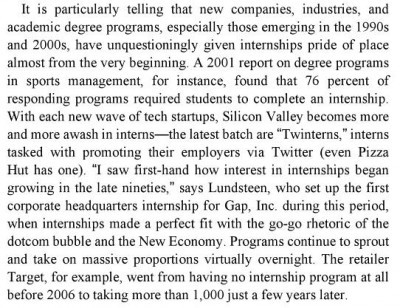
After the suit against Fox Searchlight, the production company behind Black Swan, unpaid internships have gotten more attention. Have you heard of any new egregious examples of unpaid interns?
More than 20 lawsuits have been filed by unpaid interns over the past two years, and this may be just the beginning. Cases where interns may have been sexually harassed but aren’t allowed to get justice are particularly galling — the recent Phoenix TV case is a prime example, demonstrating that unpaid interns also fall into a kind of legal limbo when it comes to workplace rights.
Do you see any possibility for reform?
I think that the recent lawsuits, organizing efforts like Intern Labor Rights and the Fair Pay Campaign, changing policies at companies and colleges, and the serious recent media interest in the topic all offer grounds for hope — all this has happened since Intern Nation came out. But for now lots of people are still literally paying their colleges to go work unpaid off campus, feeling they have no other choice, which is sheer madness. I don’t think the government will really start enforcing the law until people demand it. And interns have to do more than just vote with their feet–they have to organize and speak up and help end the practice of unpaid internships in the near future. They basically didn’t exist 30, 40 years ago and hopefully in another 30 years they’ll just be a distant memory. I think people are just starting to wake up.
Llewellyn Hinkes-Jones is a Washington, D.C.-based writer and programmer whose work appears in The Atlantic Cities, The LA Review of Books and The Morning News. Photo by Travis Isaacs.
New York City, October 23, 2013
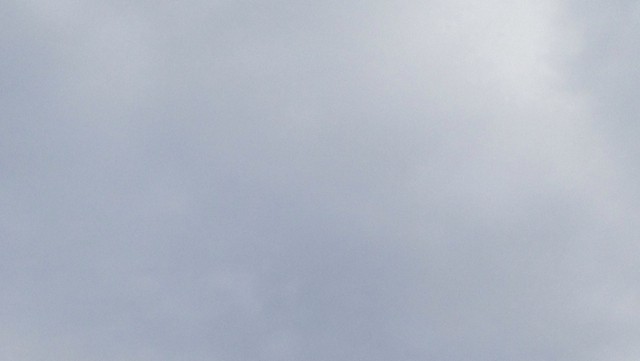
★ Dull and a little raw. Banging from the construction site carried clearly under the cloud cover. Something crunched under a passing tire, sending the pigeons scattering from the street up to the shelter of the back side of a Trump building. The sun was a metallic smear among the clouds for a while, and then it wasn’t even that. In the afternoon there was a rumor of sunshine out the windows, but there was nothing to substantiate it later on. Some sort of fluff was in the air, and the drifting bits kept looking impossibly but not implausibly like snow.
Paul McCartney, "Queenie Eye"
Both this song and its video are perfectly serviceable and entirely unnecessary but my question to you is, How many other indisputable musical geniuses are still around today? I mean, on the level of Paul McCartney? Stevie Wonder, sure, and probably Willie Nelson. But there aren’t a lot of other people who you will be able to turn to your grandchildren when they ask you about them and say, “You know, I was alive at the same time he was. I remember seeing his videos, and I saw him live on TV a couple of times. Now be very quiet, because the killer robots are circling the ground we are hiding beneath, and we don’t want to get eaten by their metal jaws, here in the future. Let’s play the pretend-to-be-asleep game.” Maybe also Prince. [Via]
Bear Lingers Outside Of Dentist's Office, Ultimately Decides Against Going In
I know I say this to all the bears, but you, Florida bear who perched outside the chamber of horrors that is the dentist’s office before deciding to disappear into the day, are my spirit animal. Go with God. [Via]
Traditionalists Upset
“Just like Paris Hilton ruined Amnesia in Ibiza, another vomit-inducing narcissist of the fake celebrity world has decided to ruin everything sacred in the scene we know and love.”
— Guess who. GUESS! [Via]
Why Twitter Is Stupider Than Usual And No It's Not The IPO
Here is why a bunch of putative adults are running around on social media with Count Chocula names now. [Via]
What It's Like To Interview Lorde
by Matthew J.X. Malady
People are always saying things on the Internet all the time. But they are such teases. We like details. So we have to ask.
Interviewing @lordemusic over dinner, I suggested sharing truffle pizza. Her reply: “Then you’ll write about it like Lynn Hirschberg!”
— Jonah Weiner (@jonahweiner) October 11, 2013
Jonah! So what happened here?
Rolling Stone asked me to write a short profile of Lorde, a young musician from New Zealand whose single “Royals” has been the number-one song in America for three weeks now. This was just the other week. She was in Los Angeles to tape a performance of “Royals” for Ellen, and I spent the day with her. For dinner, we went to the Soho House, which is a members-only club on the penthouse level of a building in West Hollywood. An extremely fancy setting for an interview, and one that I don’t think Lorde chose herself (people in her entourage have memberships). Although she mentioned she’d just been hanging out with Tavi Gevinson at the Soho House in New York, which sounds like a fun night.
Anyway, “Royals” is about feeling a deep ambivalence toward ostentation and luxury — in the refrain, Lorde rolls her eyes at those things, even as another part of her finds them seductive. She sings about never having seen a diamond in person, about being from a “torn-up town.” (She’s from Auckland, so there’s a bit of poetic license at work.) All to say that she was probably doing some internal mental calculation about what it would mean for a scene in this profile to take place somewhere so expensive and exclusive. At the same time, neither of us had eaten much all day, so we had appetites. I spied a black-truffle pizza on the menu and, with nothing animating the decision beyond hunger and decadence, suggested that we split it. Which is when she shot back with the Hirschberg line. If I’d been drinking something when she said that, I’d have done a spit-take.
Her reply seems incredibly informed and self-aware and savvy for anyone, much less a 16-year-old. Based on the time you spent with her, is it representative of her general manner of being, and how did you respond?
If you were reading Vulture or Pitchfork or Stereogum in 2010, you were able to follow the whole Hirschberg/M.I.A. truffle thing in great depth. That piece did a lot to hurt M.I.A.’s image, but the truffle detail came off like pretty egregious artifice, and as somewhat malicious on Hirschberg’s part. When Lorde mentioned it, it was evidence of her savvy, and it was also revealing of her online reading habits, and by extension, those of pop-culture-loving adolescents of her generation. So maybe it shouldn’t have surprised me. But it’s rare that a profile subject reveals that degree of familiarity with tricks of the form. When I replied to Lorde to the effect of, “You know about that?” she followed up by talking about how Hirschberg had used the truffle-entrapment trick in another profile, of Megan Fox. So she’d done the homework.
In conclusion, the pie was delicious and she enjoyed it. I included the moment in the draft of the story that I filed; I think it made it to the published version, which is in the latest Rolling Stone, with Paul McCartney on the cover. I wrote that story, too, as it happens, and McCartney and I shared tequila shots at the Beverly Hills Hotel. Those were his idea.
Lesson learned (if any)?
I very rarely approach interviews with gotcha-style tricks up my sleeve, but I do commonly approach them from the perspective of a glutton, so I can’t rule out the possibility that in future interviews I’ll order more food that includes truffles.
Just one more thing.
She drank a virgin cocktail with dinner, so nobody needs to call child services.
Matthew J.X. Malady is a writer and editor in New York City.
Google's Plan To Increase The Number Of People Searching For "Ways To Die"
“Along the lines of self-driving cars and smart glasses, Google’s newest venture promises to wow the tech scene. Only, it’s not quite tech, at least in the traditional sense. The venture is called California Life Company, or Calico for short, and its goal is to extend human life by 20 to 100 years.”
